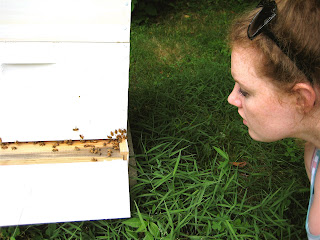I've mentioned my attraction to the smell of the beehive: honey, wood, warmth.
After identifying this, I went on a search for a perfume that could emulate that scent. I encountered a limited number of 'honey scented' products, one being L'Occitane's Honey Lemon
I finally found the perfect match. Serge Lutens Meil du Bois. I tried it on and came home to do some research - mainly to see if I could find it for a cheaper price than the $110 tag at the store. I was unable to find that, but I read many reviews of it and was surprised at how mixed or violent people's reactions to the scent were! I hadn't noticed any of the strange notes that they had detected, though it was a very full scent.
In conclusion: I own it, I love it, I would wear it every day and wrap myself up in it. line. (I found that to be too fake/sugary in addition to the citrus erasing the softness of the smell I was searching for.)
Tuesday, August 26
Late Summer Feeding

Just came in from the hive, where I put the hive-top feeder back on for a second round of feeding. I've been using a 'winter recipe' - 2.5 quarts of water and 10 lbs of sugar - in hopes of readying the bees for winter.
Still no new developments on the frames in the upper deep. Saw one swarm cell but I didn't remove it. (Ah, hindsight... why didn't I just knock it off? Oh well.) The queen seems to be very active, as one of the frames had a dense network of eggs, the other had a lot of capped and pearly white brood. The bees keep comin' and the honey doesn't stay. I can't figure that out. I found myself saying, out loud, to them, "I honestly don't know what you're going to do with this mess."
On the plus side, I saw zero hive beetles on the inner cover, where two weeks ago I had seen several. Many thanks to Linda for all of her advice via email and her awesome blog. She was able to ease my fears regarding SHB and also generally renewed my spirits.
We'll see what happens next week. Stay tuned.
(The above photo is not of my hive, but from beecare.com.)
Monday, August 18
Hope & Heartbreak, Plans and Mysteries.

Already, I am thinking about next season. When I was in Maine I decided that I needed to add at least one more hive to my yard so that I could always make comparisons, swap frames from strong hives to weak hives, and have space should I be confronted with a swarm.
In addition to a second hive of my own, I have already picked a location for another two hives on my Aunt & Uncle's property. They are located among farm fields, and I can envision those hives flourishing with so many resources. I know my uncle would like to learn more about the process - he has always been fascinated, apparently - but I would probably be making visits to those hives on a bi-weekly basis.
I am preparing myself for the very real possibility that this hive might fail for this season. As Andy says, "you never know the reason" why things go wrong. My relationship with the bees, like relationships with tempermental friends, is one of mystery - I try, I think I am doing what needs to be done, using restraint or pouring on attention as needed, remaining optimistic, but in the end sometimes I am left with nothing instead of substance. I might end up with heartbreak and unanswered questions after trying my damnedest.
Late Summer

The hive-top feeder that I put in place last week contained about one gallon of thick sugar syrup, which I hoped would inspire the bees to stock up for winter. Luckily, it was empty today. [Above - the bees in the removed, empty feeder zoom back towards the hive.]
They're in no shape to overwinter so far. They ought to have one super of honey and one of brood, theoretically, and they have about half and half in one super. Not even. In fact, if there is 10 lbs of honey in there, I'd be shocked. [They need about 70 to overwinter]. I can't fathom how they're continuing to boom in numbers when they aren't building in the upper deep and aren't capping any honey. This hive, frankly, is doomed.
I am going to double up the batch, or maybe triple it for next weekend, since they'd started one frame of all sugar water in the top super. In real life, they'd have built that up from a hearty nectar flow, but I feel like there is a lull in the fields and the bees are being lazy. If I were selling the honey, this would be outrageous and tacky, but since I'm just trying to get the bees ready to feed themselves, the richness of the honey is secondary to the volume, in this case.
Small Hive Beetle

Last week I had some more friends stop by to see the hive. It's gotten to the point where I invite anyone within earshot, each week. I love being able to talk about the bees, and I love hearing what people think and answering questions, or considering things that hadn't occurred to me. Some beekeepers use time with their hives as a sort of meditation, but I happily flip-flop between bee-solace and show-and-tell modes.
At any rate, this particular weekend (8.09.08) was another fraught with impending peril for my bees. The presence of what I am certain is the Small Hive Beetle. (SHB). [In the photo above, you can see the beetles - black, tinier than the bees. That is not my hive, also.] The hive beetle is an invasive species now in the United States and having originated from Africa. It is most prevalent in Southern states, where warmer soil temperatures prevent the beetle larvae from freezing in the ground. The larvae hatch and move up into the hive, where they tunnel through frames, eat and defecate in the bees' honey, and generally destroy the hive. If the infestation gets to be too much, the bees will abscond in search of a cleaner, beetle-free home.
Now, how did they get into my hive?? I have no idea. I had never seen them before, but there was no denying that they were in. There are two differences from the previous week to this week - between a week without beetles and a week of discovering them - and I am pretty sure I know what happened. One is that I had propped the outer cover open so that the bees could get ventilation. I had never done this before, and did so after seeing Andy's hives set up like that. (I had been concerned about the bearding and thought the heat might have slowed up the bees' production.) Perhaps the beetles were nearby and now had easier access to the inside of the hive. Secondly - and most likely - was the new addition of a bee brush to my beekeeping process. Andy had given me one of his brushes, which had been in his garage for months. I did not own one and he gave it to me, as he had extras. Andy also had told me about these beetles, which, until then, I had not heard of. So... were the beetles transferred from his hives to mine via the bee brush? I have no idea, but it seems more likely than any other thing I can think of, since SHB are not a major crisis in the northeast.
I am hoping that their population will be kept under control by my bees, but I am (as always) fearing the worst. Today - one week after the initial discovery of the beetles - I noticed a few tunnels on one frame, but saw nothing alarming as far as beetle larvae or fermented honey.
Here's hoping.
Sunday, August 3
Motherly

I am always concerned about these bees - if it's not one thing, it's another. I should not be surprised that I feel this way, since I know that's the type of mother I would be if I had an actual child.
Today I opened up the hive for the first time in several weeks. I had wanted to time it to coincide with Cara and Carin's visit, and I also invited over a few friends who were curious about the setup. It was also the first time I had looked into the hive since meeting with Andy, an 80 year old man who keeps bees in South Jersey and who's family has kept bees in Poland for decades. (They still do - he is going to visit them this week!)
A short note about Andy, the bee man:
He has a row of about 10 hives or so, but only about 6 are active. He told me that the number fluctuates from season to season, and I got the impression that he has had some disheartening experiences in his many, many years of beekeeping. He said to me, "Things happen with the bees... you never know. Things go wrong and you'll never know the reason."
He was impressed by my knowledge of beekeeping, I think, but listening to myself talk with him, I saw myself as I'm sure he did: eager, emotional, nervous and a rookie.
He showed me two of his weakest hive. One had no queen, one had just swarmed. The swarm hive had produced honey, already. He barely smoked them, and he approached the hives with calm and that was helpful to see.
Today I channeled that calm and tried to look at the hive with my fact-reciting brain as opposed to my rookie beekeeper jittery nerves sensibility. These are some things we saw - some are good, some are disconcerting and some are just neat:
- No new building in the upper deep, but the three frames I moved up there had hatched AND new eggs were in those cells.
- The queen was moving rapidly through one of the frames in the lower deep.
- No more swarm cells.
- We watched some bees hatch from their cells.
- Very little capped honey on any frame. This part unsettles me the most and I am not sure how to address it or where to look for information.
I closed the hive and propped the cover open with a block of wood - like Andy had had - in an attempt to ease the heat within the hive. If this helps, I'll leave it, but if they act the same then I'll take it out because I worry that it could chill them (unlikely) or incite robbing (though there is little to be robbed.)
Subscribe to:
Comments (Atom)


